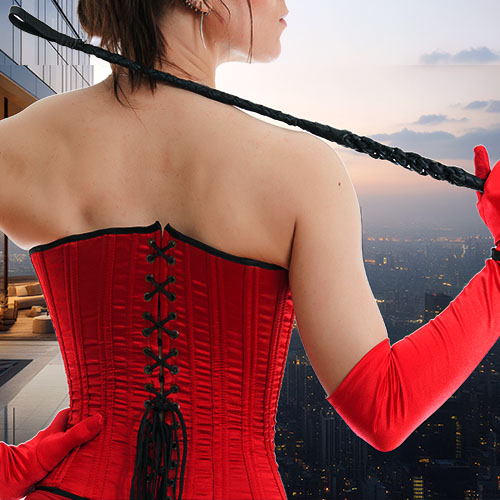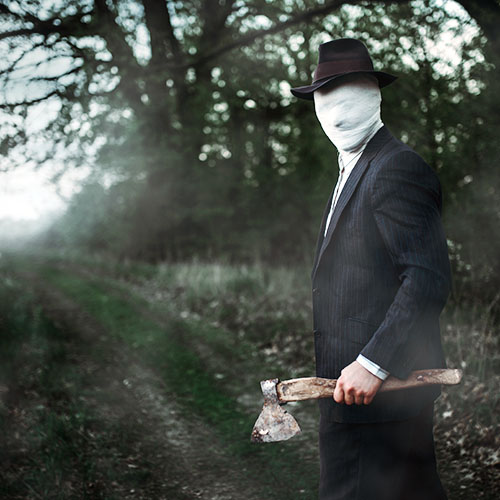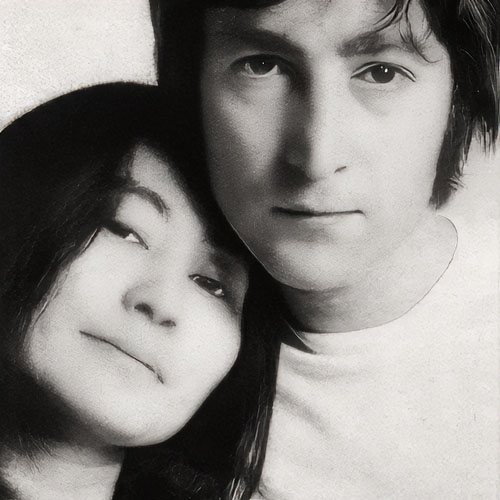Andreas van Kuijk, an illegal Dutch alien, reinvented himself as Colonel Tom Parker. Then, through the magic of Elvis Presley, he invented rock-‘n’-roll culture. The Colonel had his secrets, and he protected them at all costs. But now, at the end of his life, would he finally set the record straight?
Colonel Tom Parker: Devil in Disguise
The old man slumped in his seat, a mountainous heap of flesh, his body, some might have said, a temple to gluttony and greed, feeding off of the dimmer wits of others. He was holding court, on this morning in December 1992, in booth No. 1 of the Sirocco Springs coffee shop at the Las Vegas Hilton. It was his booth-perpetually reserved for the man whose act, and whose own high-roller activity, had meant so many millions for the hotel that no one could keep count anymore. At the Hilton, Colonel Tom Parker, born Andreas van Kuijk, an illegal alien from Holland who invented rock- ‘n’ -roll culture through his most famous client — Elvis Presley, of course — inspired fear and trepidation among the bosses and employees alike.
“Larry!” he yelled belligerently to a man who hurried past without stopping. “Pay your respects!”
And then the Colonel turned back to his guests: Lorrie Morgan, the country singer he had booked into the hotel’s showroom, and Lorrie’s mother, Anna Trainor. Forty years earlier, Parker had handled dates for Trainor’s first husband, the late Grand Ole Opry star George Morgan. Today, the 83-year-old Parker was in a sentimental mood — a godsend for me.
I had come to Las Vegas specifically to find the Colonel (his title was an honorary commission bestowed upon him by Louisiana Governor Jimmie Davis in 1948), and had brought along a friend to boost my courage. This was the first time either of us had been to Sin City, but to me nothing — not the dazzling neon Strip, the garish Liberace Museum, or the toga-wrapped greeters at Caesar’s Palace — compared to that first sight of Colonel Thomas Andrew Parker. I had been thinking about him for a very long time — at least since 1977, when Elvis died, sprawled on the bathroom floor in his beloved Graceland.
Now I had a request to put to the Colonel. I was writing a book with three members of Elvis’s so-called Memphis Mafia, and I wanted Parker to respond to their allegations that Parker had mismanaged and defrauded the star. I also hoped he would comment on a 1981 report filed by the court-appointed guardian of Elvis’s daughter, Lisa Marie Presley, who had inherited the singer’s fortune.
The report deemed Parker’s 50-percent commission “excessive, imprudent, unfair to the estate, and beyond all reasonable bounds of industry standards.” Lawyer E. Blanchard Tuai, the guardian ad litem, furthermore charged that Parker had been guilty of “self-dealing and overreaching,” and that he had “violated his duty both to Elvis …and to the estate.” Most members of the Memphis Mafia believed that Parker’s mishandling of Elvis inadvertently brought about the entertainer’s artistic and physical demise, and I wanted the Colonel to have the opportunity to redeem his reputation from that of the villain in the Presley saga.
But more than anything, I wanted a chance to meet Colonel Parker, to hear how he spoke, watch how he moved and conducted himself. Acting on a tip from Lorrie Morgan’s manager, I cabbed it over to the Hilton and sat at a table with an unobstructed view of booth No. 1. In my mind I practiced how I’d break the ice: I would remind Parker that he had once signed a photo for me at the request of Alan Fortas, one of the few members of the Memphis Mafia who spoke glowingly of Parker’s uncanny understanding of human nature, and his ability to outsmart nearly all comers with his mix of flimflam daring and cunning guile. I had finished ghost-writing a book for Fortas just before he died of kidney cancer earlier that year.
When Morgan and her mother got up to leave, my friend and I made our way over. Up close, the Colonel looked ancient: yellowed skin, thin and easily bruised, with liver spots sprinkling his hands and face like so many insects. His chest, a cascade of drooping flesh, resembled a spent tea bag inside the white shirt and black-and-gray geometric-design sweater; he’d managed to stuff his elephantine girth into a pair of gray trousers. A brown felt cowboy hat, accented with a feather band, crowned his head. His wooden cane lay beside him in the seat.
“Colonel Parker, I wanted to introduce myself,” I began. “I’m Alanna Nash. I was Alan Fortas’s friend.”
“What?” said a blank-faced Colonel, who had a flesh-toned hearing aid snuggled into each ear.
Parker’s wife, Loanne, a tall, long-faced woman some 25 years his junior, came to my rescue. “You remember, Colonel,” she said, taking his arm. “This is the lady who wrote Alan’s book. You signed a photo for her, and we sent it to Alan.”
“Oh, yes,” came the reply. He brightened. “You want another picture?” Without waiting for an answer, he produced a felt-tip pen and motioned toward his briefcase. “Loanne, give me some pictures.”
“You know, I called Alan 79 times,” he began. “Every Sunday, and for a while every day. And I called Priscilla [Presley] and told her to go see him. I even called the members of the Jewish community to get them to go to the funeral.”
“You were very kind to Alan,” I said, recalling that I had been told Parker always had an ulterior motive in any friendship, and remembering that Alan had been a nephew of Lyndon Johnson’s close adviser Abe Fortas, a Supreme Court judge and LBJ’s failed nominee for chief justice.
The Colonel shrugged his shoulders. “Well, you know,” he said, his voice brittle, high, and hoarse, “old ties, old friendships.”
I introduced my friend, and Colonel asked her if she wrote books too.
“No, I’m a broker,” she replied.
The Colonel’s azure eyes snapped to attention. “Smart!” he said, smiling. “You handle the money!”
And then he was off on a one-man PR campaign for the reputation of Colonel Tom Parker, attempting to persuade us that despite his glee at the mention of money, he routinely gave it away whenever a deserving cause crossed his path. I sensed he was just getting started. “Would it be all right if we joined you?” I asked.
“Oh, sure,” the Colonel said. We slid into the vinyl seats. “You want something to eat? Order anything you want from the menu.”
We declined his invitation, but watched as he polished off his meal. The Colonel was naturally right-handed, but an accident at the RCA building in Hollywood some years back had virtually frozen his right shoulder. (He fell while entering the elevator, and the door repeatedly pummeled him, in what some would call poetic justice for his treatment of Elvis.) Now he gripped his fork in his left fist and used it as a shovel.
While Parker gave off vibrations that said, “Don’t ask me any questions, and if you do, they’d better not be about Elvis,” I inquired about the shoulder. He confirmed the elevator story, and then broke into a grin. “Dolly Parton…” he began, and looked at Loanne. “What is it she calls me? ‘My hero’?” Then he told us that he’d met her on the set of The Best Little Whorehouse in Texas, and she’d asked to have her picture taken with him. “Put your arm around my waist,” the cantilevered singer told him. He said he couldn’t — he wasn’t able to lift his arm. “Well then, just lay your hand on my ass!” Parton wisecracked. The Colonel wasn’t the sort of man given to coarse language, but Parton had charmed him, and now his body shook with laughter in the telling.
“Isn’t he wonderful?” beamed Loanne, who had served as Parker’s secretary and married him after the death of his first wife. “Colonel has a lot of fascinating stories,” she said, her melodic voice filled with childlike wonder.
“You know, Colonel,” I said, “when I was a kid I saw a photograph of you and Elvis with a picture of Nipper [the RCA dog] and a basset hound in the background. After that I started a Nipper collection of my own.”
“I’ve got one in the kitchen to guard the meat,” he said, straight-faced. “When Loanne gets too close to it, Nipper goes, ‘Grrrrr.’” He looked over at her; the Colonel’s best friend just laughed.
Suddenly I remembered to tell him about the Memphis Mafia book. But the timing felt wrong. The Colonel was putting on a show for us, and to bring up such an indelicate topic now would spoil the moment. I decided to write to him once I got home.
For an hour and a half we sat enthralled as Parker dipped into his vast reservoir of anecdotes. He bragged that after Elvis’s death he’d been asked to manage some of the biggest stars in the business, and he offered distinctly carnival-like tips on how I could sell Alan’s book. (“You don’t have a photo of the two of you together? Just superimpose one. Nobody’II ever know the difference!”) And he was candid, if nonspecific, about his health, alluding to a hospital stay three years before. “I didn’t want the word to get out,” Parker all but whispered. “The tabloids would have said, ‘Colonel is dying.’”
I still hoped that he might share some untold stories about the most famous entertainer of all, but that was not to be, not with me or anyone else. (“The first time I played Vegas years ago,” remembers singer Pam Tillis, “Tom came out and took me out to lunch. I wanted to hear all about Elvis, but every time I’d ask him something, all he would say was, ‘Boy, ain’t this fried chicken good? I believe it’s the best chicken I ever had.’ And that was it.”) The Colonel had his secrets, and he protected them at all costs.
“Do you think we could have a picture together?” my friend asked, producing a camera from her purse.
The Colonel looked pleased. “All four of us,” he said, beginning to heave himself up from the cushy seat. The wooden cane wobbled, and the old man grew as red and shaky as aspic. But I didn’t dare help — I’d been told the Colonel loathed to be touched. Finally he pulled himself upright and steadied his weight.
“Loanne,” he said. “Get the hostess to take it.” In a second his wife was back, a humorless matron in tow. “No, not that one,” he mumbled under his breath, and made a face. But it was too late. Flash! And then three more.
“Colonel,” I said, “thank you so much for your time.”
“Me too,” said my friend, who, uninformed about the “no touch” rule, rushed in and kissed him on the cheek. My blood stopped flowing.
The Colonel looked stunned, but not unhappy. “You caught me in a weakened state.” Years ago, he went on to say, at the famed Los Angeles restaurant Chasen’s, he used to strong-arm women who walked up to him. “They would come in and say, ‘Oh, Colonel,’ and kiss-kiss,” he said, gesturing toward his cheek. So he devised a strategy. As they came toward him, he’d grab their arms, tighten his grip, and lock his elbows to hold them off.
“Some it didn’t work on,” he said. “Finally I got some fake warts with blood coming out and put ’em on, and they’d come in and see those and say [reserved tone], ‘Oh, hello, Colonel, how are you?’” He grinned. “No kissing!”
We stood there laughing, and then the Colonel surprised me again.
“If I can help you in any way, let me know,” he said. I told him I appreciated it. “Hey,” he went on, “you got more time than anybody — and it didn’t cost you nothing!”
He turned to my friend. “You like gambling? On your way out, look for the Spin Till You Win machine. It’s over in the far corner. Best payoff in the house.”
The following morning the phone rang at 9:20. Though I’d never mentioned where I was staying, the Colonel had tracked me down. “You didn’t know I was an FBI agent, did you?” he joked. I laughed, amazed that he had gone to the trouble of finding me.
“Say, I sure liked your friend,” he said. “I thought maybe the two of you would like to go tonight to see Starlight Express [the Andrew Lloyd Webber musical then playing at the Hilton]. I got tickets for you if you like.”
Since the Colonel seldom gave away free tickets to any of Elvis’s shows, this seemed completely out of character. As it turned out, we couldn’t go, but I thanked him for his kindness.
“You know, I was thinking about other ways to promote Alan’s book,” he began.
I listened politely, and then told him I was working on something else now — the Memphis Mafia story.
His tone changed abruptly. “Oh, there are already too many books, and there’ll be more,” he said. “The more there are, the less they’ll sell.”
Then, after he recommended a few shows and advised us not to walk around by ourselves at night, he hung up. The conversation had an unfinished sense about it, and left me feeling restless. A week later I sent him a Christopher Radko Christmas ornament in the shape of a circus elephant, since he took pride in his collection of elephant memorabilia. I never heard back.
In the spring of 1994 I was well into the writing of the book, and I took another crack at getting the Colonel’s cooperation. I was coming to town in June, I wrote him, and asked for a short interview. “I wish you luck with your book,” he replied, “and both of us will be glad to see you when you visit here … but not in the capacity of you being a writer — just a friend.”
He phoned me at the hotel on the appointed day. I told him I had another friend with me, and at first he seemed to balk, then acquiesced. “We’re on,” I told her. She was a real-estate agent, wife, and mother of two, and a trusted confidante, but better still, she kept a level head. Mine was apt to swirl around the Snowman.
At exactly noon — the Colonel was a stickler about promptness — a blood-red Buick pulled up at the valet stand in front of the Hilton. Loanne sat behind the wheel, and Parker, dressed for the 106-degree heat in blue trousers under a light-blue smock of a shirt with COLONEL embroidered in white script on a dark-blue epaulet, sat motionless beside her in the front seat. A blue newsboy cap was perched jauntily on his head.
I introduced my friend, and Loanne offered a smile. But, whether or not his shoulder injury was to blame, the Colonel never turned around. He didn’t need to — he had eyes in the back of his head. “I see you’re keeping your weight down,” he said.
Things got looser at the N’Orleans Restaurant, an informal “meat-‘n’-two” place in Lucky’s Shopping Center, a run-of-the-mill strip mall on West Spring Mountain Road. The Colonel was a regular there, and the owner herself took our order. “If the lunch is free, I’ll leave a tip,” the Colonel said without the slightest smile. “If it isn’t, give the check to Loanne.”
“You always leave a lasting impression, that’s what you leave,” she zinged back, but she was joking too. It was Loanne who carried the money, and the Parkers were known to tip generously, even remembering the busboy.
The difficulty in being around the Colonel was that he didn’t invite much of a real exchange. Parker was his own sideshow, and you were there to watch it. We were deep into our second visit now, and he still hadn’t really broached the obvious topic: Elvis. Today the Colonel seemed intent on showing me just what a big shot he was, before and apart from his ticket to infamy.
“You know, I knew five presidents,” he announced out of the blue. “Franklin Roosevelt was the easiest to know. I knew him from Warm Springs, Georgia, because we played there” — an allusion to the small carnivals Parker worked, selling candy apples and tending elephants in the thirties. “Of course, I knew [Lyndon] Johnson real good too. He used to send me Christmas gifts.”
Loanne wiped the spittle from the corners of his mouth and dropped a bubble of lubrication into each eye. The Colonel blinked, then pretended to bite her hand off with playful affection. Then, after the requisite doling out of pills, we walked to the car. Colonel, who had once stood six feet or more, was so bent over that he appeared to be a head shorter than his nurse of a wife. The cane in his gnarled left hand supported the bulk of his weight — somewhere around 250, I’d guess — while Loanne crooked his arm in hers for balance.
“I’m almost 85, you know,” the Colonel said to me when we were back in the car. His birthday was only eight days away, and celebrations had always been special to him.
“Yes, Colonel,” I said. “Happy birthday! I’ve been trying to think of a good gift for you.”
The old man was ready. “I want something I don’t have to feed, dust, polish, wash, or walk.”
“What’s that, Colonel?”
“Your loyalty and friendship,” he said. And, he might as well have added, “admiration.”
This was an odd thing to be hearing from the back of a head, and while I pondered what it actually meant, the Colonel began to answer the questions I hadn’t yet asked. He hammered his words home with the tapping of his cane on the floor mat. “I knew Elvis better than anybody. I wouldn’t see him sometimes for two months, but we’d talk every week. Elvis was very sharp, even if people thought he wasn’t. And he wasn’t weak, either. Elvis picked all his own songs and pictures — the scripts were sent directly to his house. The only song I suggested was ‘Are You Lonesome Tonight?’ I got Elvis the most money ever for an entertainer in Las Vegas. People forget that! Nobody! Nobody got more money in the history of Las Vegas!”
His anger hung in the air.
“Colonel, if you feel you’ve been misrepresented, then why won’t you set the record straight?” I asked.
“I don’t have no trouble sleeping,” came the reply. “People who worry about things like that don’t sleep good. The William Morris Agency told me they could get me $2 million for a book. But publishers today want dirt. And I am not a dirt farmer!”
His voice rose, and for a moment I thought he might order us out of the car. And then he was silent.
I tried to change the subject, maybe brighten the mood, but the front seat remained resolute all the way to the Hilton. Loanne pulled into the valet stand, and we thanked them for the afternoon. Then the Colonel spoke again, this time in code. “I’m going to tell you something that I want you to remember,” he started. “When a baby has to go, you take off its diaper. You don’t want no dirty diaper on a baby.”
“I’ll remember it, Colonel,” I said, “even though I don’t have the faintest idea what it means.” Loanne chuckled. The Colonel stared ahead. Still, I hoped to see him again.
That opportunity came in December 1994, on a record-company junket to Vegas. I called the Colonel, who once again invited me to lunch, “if you don’t mind stopping by the clinic with us for a little while.”
The owner of the clinic was Dr. Elias Ghanem, a smart, swarthy Lebanese who had cornered the Las Vegas Hilton’s business in the 1970s. He also had been one of Elvis’s main suppliers of “medication,” sometimes donning an Elvis-like jumpsuit to visit the singer backstage.
The reason for our visit to Ghanem’s clinic this day was preventive. Loanne was courting a cold, and the Colonel, who suffered from gout and arthritis, wanted to get his foot checked. Loanne feared it was infected.
The Colonel, nattily attired in gray wool trousers, another geometric-design sweater, and a Kangol cap, looked much older than he had when I’d first met him two years earlier. His skin had begun to take on a sallow, decaying look. He looked like a man in his late nineties.
“He’s on a long list of medications,” Loanne told the attending physician, a young Asian. But the Colonel wanted Loanne to be checked first (“Give her a shot or something”), and as she was shown into an examining room, he motioned to me. “You go on in with her,” he said.
Across the hall, the Colonel sat in a big chair facing the doorway, his shoe and sock beside him. His toe was fine, just bruised, and he teased first with the doctor and then the nurse, who strained at her task of replacing Parker’s shoe.
“Ow!” he yelled.
“I’m not a good shoe-put-er-on-er,” the nurse admitted.
“No,” quipped the Colonel, “but you’re a good pincher.”
Loanne, ever ready, pulled a shoe-horn from her purse.
At lunch, at the more upscale Hungry Hunter on South Rainbow Boulevard, the Colonel was feeling well enough to order a hearty meal. “I’d like to treat you both,” I said.
Suddenly the Colonel turned sullen. “I can’t eat,” he protested. Surely the man who had a reputation for never passing up a free meal was joking.
“No, he means it,” Loanne added. “He’s a stubborn Dutchman.”
“In return,” Colonel said, “I’d like an autographed copy of your book.”
I blushed. The Colonel would certainly be enraged by what the Memphis Mafia had had to say about him. And I was still hoping to get him to explain how he justified taking 50 percent of Elvis’s income, or admit if he ever tried to curtail Presley’s drug use. If the old man had been unfairly maligned, I wanted to present his case.
When the food came, the Colonel sent his roast beef back three times (“It’s too rare,” “It’s not hot enough,” “Hey, put another piece of meat on there!”), and began picking Elvis topics out of the air: How Parker chose all the record-cover photos, how he packaged an album made up entirely of the star’s onstage prattle (Having Fun With Elvis on Stage), how he was invited to Elvis’s parties but didn’t go because there were only young people there — including hungry new agents, who would try to convince the ever-faithful Presley they could get him more money.
And, most important, how papa Vernon Presley announced, “Colonel Parker is an honest man,” in a taped postscript to Elvis in Concert, the CBS television special shot in the summer of 1977 and aired after Elvis’s death.
On the way back to town, Loanne made a quick side trip to pick up the mail — they rented a post-office box in one of the strip malls that lined the flat Vegas landscape. “Be right back,” she said, and for the first and only time, Parker and I were alone. “We wouldn’t have come out for anybody but you today,” he began, staring, as ever, straight ahead. I thanked him, and told him what it meant to me.
“Say, I want to run a title past you, because I respect your opinion,” he said. “I wrote a song.”
“I didn’t know you wrote songs, Colonel.”
“Yes. I can’t write music, but I’ve got a terrific music man. I want to know what you think of this title: ‘I Talk to Myself About You.’”
I liked it, and told him so, not mentioning that we both knew Fred Rose had thought of it half a century before, and that Eddy Arnold had recorded the song in 1945. I wondered if he was talking in code again, sending me a message.
“Of course, I write poetry too. Did you see the one on the Elvis statue there in the Hilton?”
I told him I had, but stopped short of saying it was good. The Elvis poem was doggerel: “The songs he sang at home each day / Pleased his Parents in every way.” But another poem Parker had written in January 1978, titled “To My Friend,” was a most revealing glimpse at a man who almost never apologized for anything: “They say I’m tough and sometimes cold / But I’m really just as good as gold / …So if you’re right and I am wrong / Please remember the good I’ve done.”
When Loanne came back, lighting up the Colonel’s face with a dozen birthday cards, I asked if she would drop me off at a nearby mall, and explained I had my eye on an autographed picture of Hank Williams Sr., circa 1951. We rode along without talking for a while, and then the back of the head spoke again.
“We’ve adopted a son, you know.”
“Oh, yes? A four-footed one?”
“I should say not. Loanne, where’s that picture?”
Loanne dug around in her purse, and then handed back a tattered picture of a large homemade-looking boy doll — a rag street-vendor doll, as it turned out — posed with a teddy bear.
“Boy and bear,” Colonel announced proudly.
“Very handsome,” I said. “What’s his name?”
“Andre.”
The jolt of hearing Colonel Parker pronounce the name he had hidden from the world for 65 years rendered me temporarily speechless. I held the snapshot for maybe 30 seconds, looking at it intently, not knowing what to say.
“Loanne,” Parker chided, “get your picture back.”
“Colonel, she’s not going to steal it,” she said, and reached back toward my outstretched hand.
“Well,” offered the Colonel as the Buick pulled up in front of the mall, “I hope you’ve enjoyed your afternoon.” He sounded like he meant it.
“You know I have, Colonel,” I said, mindful that this was probably the last time I would see him. “And I realize you didn’t feel like socializing much.”
“Neither one of us is 100 percent today,” he conceded. “But we didn’t want to disappoint you. I don’t like to hurt people.”
With that he was gone. In January 1997 he would die of a stroke, taking his secrets with him. Including why he ever put up with me.
We could not begin to provide meaningful links to the life of Elvis Presley without filling up another page. We decided, therefore, that we won’t be cruel and treat you like a hound dog, y’know, lest you return us to sender. We can send you to a free Vanity Fair article on the colonel, though. They only give you one free one, but if you like Tom Hanks and are considering that Elvis movie on your next streaming adventure, you might want to spend your vanity card here. Not that you should necessarily believe the critic, of course. Even critics hate critics.
























